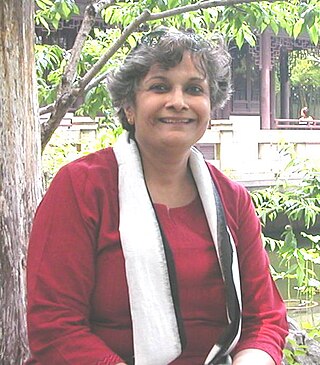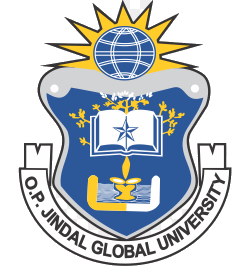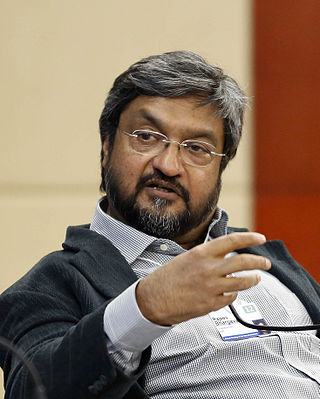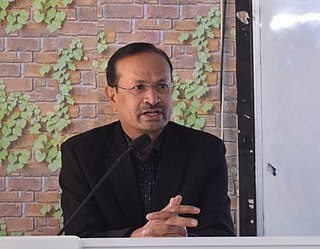Related Research Articles

André Beteille, is an Indian sociologist, writer and academician. He is known for his studies of the caste system in South India. He has served with educational institutions in India such as Delhi School of Economics, North Eastern Hill University, and Ashoka University.

Ashis Nandy is an Indian political psychologist, social theorist, and critic. A trained clinical psychologist, Nandy has provided theoretical critiques of European colonialism, development, modernity, secularism, Hindutva, science, technology, nuclearism, cosmopolitanism, and utopia. He has also offered alternative conceptions relating to cosmopolitanism and critical traditionalism. In addition to the above, Nandy has offered an original historical profile of India's commercial cinema as well as critiques of state and violence.

Upendra Baxi is a legal scholar, since 1996 professor of law in development at the University of Warwick, United Kingdom. He is presently a Research Professor of Law and Distinguished Scholar in Public Law and Jurisprudence at the Jindal Global Law School, OP Jindal Global University. He has been the vice-chancellor of University of Delhi (1990–1994), prior to which he held the position of professor of law at the same university for 23 years (1973–1996). He has also served as the vice-chancellor of the University of South Gujarat, Surat, India (1982–1985).
Amiya Kumar Bagchi is an Indian political economist.

Sanjeev Sanyal is an Indian economist and popular historian. He is a member of the Economic Advisory Council to the Prime Minister of India, and has helped prepare six editions of the Economic Survey of India starting in 2017. Sanyal has written several books on Indian history to mixed reviews.
Purushottama Bilimoria is an Australian-American philosopher and Professor at O.P. Jindal Global University.

Yogendra Yadav is an Indian activist, psephologist and politician whose primary interests are in the political and social sciences. He was a Senior Fellow at the Centre for the Study of Developing Societies (CSDS), Delhi from 2004 to 2016. He is a former member of University Grants Commission (UGC) and National Advisory Council on Right to Education Act (NAC-RTE) constituted by Ministry of Human Resources and Development, Govt of India, in 2010. He was a member of the National Executive of the Aam Aadmi Party until 2015.

Sujata Patel is an Indian sociologist, currently holding the position of National Fellow at the Indian Institute of Advanced Study.
The concept of cognitive justice is based on the recognition of the plurality of knowledge and expresses the right of the different forms of knowledge to co-exist.

Vinay Lal is a historian of India. He is Professor of History and Asian American Studies at UCLA. He writes widely on the history and culture of colonial and modern India, popular and public culture in India, cinema, historiography, the politics of world history, the Indian diaspora, global politics, contemporary American politics, the life and thought of Mohandas Gandhi, Hinduism, and the politics of knowledge systems. He is known for his radical political views and for making his history lectures available for free on his YouTube channel.
Susan Visvanathan is an Indian sociologist, social anthropologist and a fiction writer. She is well known for her writings on religious dialogue and sociology of religion. Her first book Christians of Kerala: History, Belief and Ritual among the Yakoba is a pathbreaking work in the field of sociology of religion.

O.P. Jindal Global is a private university located at Sonipat in Haryana, India. It was established in 2009 as a philanthropic initiative of its founding chancellor, Naveen Jindal in memory of his father, O.P. Jindal. In 2020, UGC named JGU as an Institute of Eminence, making it one of the ten private universities in India to have received the distinction. The university offers 45 programmes in law, liberal arts, life sciences and business.

Rajeev Bhargava is a noted Indian political theorist, who was professor of political theory at the Jawaharlal Nehru University, Delhi. His works on political theory, multiculturalism, identity politics and secularism have evoked sharp debates.
Rajni Kothari was an Indian political scientist, political theorist, academic and writer. He was the founder of Centre for the Study of Developing Societies (CSDS) in 1963, a social sciences and humanities research institute, based in Delhi and Lokayan, started in 1980 as a forum for interaction between activists and intellectuals. He was also associated with Indian Council of Social Science Research, International Foundation for Development Alternatives, and People's Union for Civil Liberties.
Dipankar Gupta is an Indian sociologist and public intellectual. He was formerly Professor in the Centre for the Study of Social Systems, Jawaharlal Nehru University, New Delhi. For a brief period from 1993 to 1994, he was also associated with the Delhi School of Economics as Professor in the Department of Sociology. His current research interests include rural-urban transformation, labour laws in the informal sector, modernity, ethnicity, caste and stratification. He is a regular columnist with The Times of India, The Hindu and occasionally in The Indian Express and Anandbazar Patrika in Bengali. He serves on the board of institutions like the Reserve Bank of India, the National Bank for Agricultural and Rural Development (NABARD) and Max India.
Tharailath Koshy Oommen is an Indian sociologist, author, teacher, and Professor Emeritus at the Centre for the Study of Social Systems, Jawaharlal Nehru University. He was awarded Padma Bhushan, the third highest Indian civilian award in 2008 for his services to the fields of education and literature by the President of India.
Science and technology studies (STS) in India is a fast growing field of academic inquiry in India since the 1980s. STS has developed in the country from the science movements of the 1970s and 1980s as well as the scholarly criticism of science and technology policies of the Indian state. Now the field is established with at least five generations of scholars and several departments and institutes specialising in science, technology and innovation policy studies.
Alok Bhattacharya is an Indian parasitologist, academic and a professor at the School of Life Sciences of the Jawaharlal Nehru University. He chairs the Biotechnology Information System Network (BITSNET) as well as the Life Sciences Expert Committee of FIST program of the Department of Science and Technology (DST). He is an elected fellow of the Indian Academy of Sciences and the Indian National Science Academy and is known for his studies on Entamoeba histolytica and species-specific calcium binding protein and its gene.
Jhillu Singh Yadav is an Indian organic chemist and the co-founder of the Indo-French Joint Laboratory for Sustainable Chemistry at Interfaces (JLSCI), jointly established by the Indian Institute of Chemical Technology and the University of Rennes 1. He is a former director of Indian Institute of Chemical Technology (IICT) and is known for his studies on organic syntheses of allylic and acetylenic alcohols and spiroacetals. He is an elected fellow of the Indian National Science Academy, the Indian Academy of Sciences National Academy of Sciences, India, Indian Institute of Chemical Engineers and The World Academy of Sciences. The Council of Scientific and Industrial Research, the apex agency of the Government of India for scientific research, awarded him the Shanti Swarup Bhatnagar Prize for Science and Technology, one of the highest Indian science awards, in 1991, for his contributions to chemical sciences.

Sanjay Kumar is an Indian political analyst and psephologist. He served as the director of Centre for the Study of Developing Societies from January 2014 to January 2020. His primarily areas of interest lies are electoral politics, political mobilization, Indian youth and Indian democracy. He has conducted research on a wide range of themes, including state of democracy in South Asia, state of Indian farmers, electoral violence and slums of Delhi.
References
- ↑ "Prof. (Dr.) Shiv Visvanathan |". 16 October 2018.
- ↑ "Visvanathan, Shiv | CSPO". Consortium for Science, Policy and Outcomes. Retrieved 2021-12-03.
- ↑ Visvanathan, Shiv. "CURRICULUM VITAE". Archived from the original on 2015-11-24.
- ↑ Visvanathan, Shiv (2017-10-28). "The little dramas in Gujarat". The Hindu. ISSN 0971-751X . Retrieved 2018-08-31.
- ↑ "Cept University". Archived from the original on 2010-04-05. Retrieved 2010-02-19.